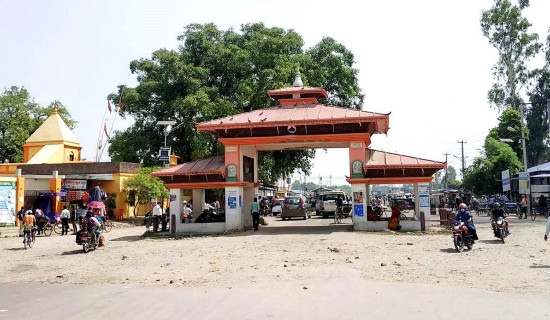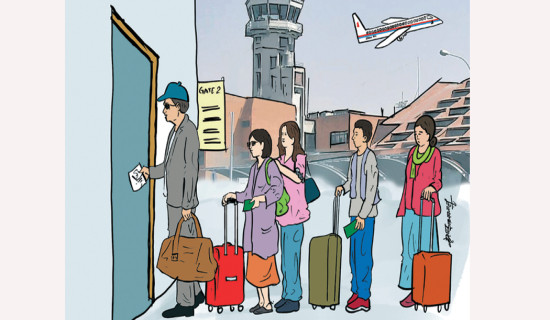- Thursday, 26 February 2026
Depositors await govt action on cooperative refund
Kathmandu, June 10: The government is finding it a daunting task to return the savings of depositors from troubled cooperative institutions.
In last year’s budget, then Finance Minister Barshaman Pun had announced a plan to refund up to Rs. 500,000 to each depositor affected by failing cooperatives. However, despite the announcement, no budget was actually allocated for this initiative in the red book (the national budget document).
As a result, the government has been unable to formulate or implement any concrete plans for refunding the depositors. Thousands of hopeful depositors, encouraged by the announcement, have been left disappointed.
According to the latest data from the Office of the Problematic Cooperative Management Committee, 54,555 depositors are yet to receive their savings back. The outstanding amount owed to these depositors stands at Rs. 38.25 billion. The amount in figures only reflects 23 troubled cooperatives identified by the government, while the actual number of defaulting cooperatives is believed to be much higher.
A special parliamentary investigation committee led by CPN-UML lawmaker Surya Thapa Chhetri, tasked with probing the misuse of cooperative savings, has reported that Rs. 71.3 billion in depositor funds have been misappropriated across 40 publicly questioned cooperatives.
Despite the gravity of the issue, the government has yet to take any substantial measures to ensure the return of these funds to depositors.
Further complicating the issues are cooperatives such as Supreme, Suryadarshan, Sahara Chitwan, Swarnalaxmi, and Sano Paila—reportedly linked to Rastriya Swatantra Party (RSP) President Rabi Lamichhane. Depositors from these cooperatives remain uncertain about when, or if, their savings will be returned.
Notably, these cooperatives have not even been officially declared ‘problematic’ by the government. Some fall under the jurisdiction of provincial governments, while others are managed by local authorities.
To manage this crisis, the federal government has established the Office of the Problematic Cooperative Management Committee. So far, it has refunded Rs. 1.67 billion to 8,155 depositors from 23 cooperatives. This amount accounts for only 4 per cent of the total claimed Rs. 39.93 billion—meaning 96 per cent of depositors' money remains unpaid.
According to the committee’s chairperson Shriman Prasad Gautam, several key challenges have turned the process of refunding cooperative depositors' money into an immensely difficult task.
The Cooperative Committee has identified four major obstacles in refunding depositors' savings and they include lack of funds, inability to auction collateral, undetectable major borrowers, and staff shortages, said chairperson Gautam.
The primary challenge is the lack of liquidity in cooperative accounts. Despite efforts to recover loans disbursed by these cooperatives, the office has been largely unsuccessful. It has requested government support, estimating that Rs. 25 billion would be required to return up to Rs. 500,000 per depositor. According to Gautam, the same kind of suggestion was also given to DPM and Finance Minister Bishnu Prasad Paudel.
In response, DPM Paudel announced a revolving fund in the latest budget. However, with the Ministry of Agriculture and Cooperatives' total budget at just Rs. 7 billion, the fund’s size is expected to be limited. The government remains hesitant to allocate large sums, fearing loan defaults by borrowers if state funds are used for repayment.
Efforts to auction collateral have also stalled. Although some properties have been transferred to cooperative names, auctions have drawn little interest. Committee Chairperson Gautam said that regulatory barriers and lengthy procedures further delay the process. He called for legal authority to directly sell collateral at fair market value.
Adding to the problem, many big borrowers—including one borrower (Tej Bahaur Bamjan) who owes nearly Rs. 280 million—remain out of contact. Over 7,000 loan accounts of borrowers have been kept blocked, but some smaller borrowers are coming into contact with the committee office seeking resolution, said Gautam.
The committee also struggles with insufficient staff. Though 72 staff were requested, only 35 have been provided so far. This shortage hinders tasks such as verifying loan documents and identifying assets.
Despite these challenges, the committee is working to recover and refund deposits. By the end of the current fiscal year, it expects to settle Rs. 2.55 billion worth of collateral and return Rs. 1.5 billion in savings of depositors.

















